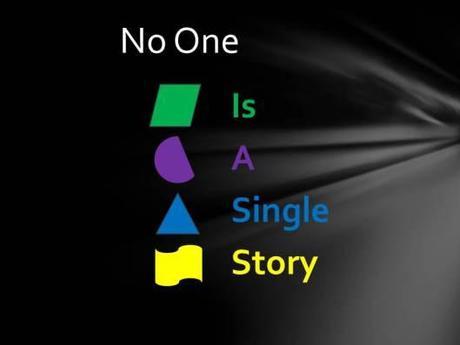
The problem with stereotypes is not that they are not true, but that they are incomplete.*
I was introducing myself at a party when the woman I was speaking with interrupted me and said “Oh, I know you. You’re that woman who….” She went on to describe one event that she had heard about from one of my acquaintances — someone who I wouldn’t have even described as a friend.
I was stunned.
This woman thought she knew me. The conversation was closed. She went on to greet other people who were beside me but our conversation was over. She knew what she wanted to know and that was the end.
A single story robs people of dignity.*
I felt robbed — robbed of identity, robbed of meaning. In the words of Chimamanda Ngozi Adichie, I felt robbed of dignity.
As angry as I was over that interaction, the unfairness of the interruption, the gross simplification of who I was based on one event, the fact that she didn’t know anything, really, about me — I realized on analysis that I have done the same.
I have acted as though I knew someone purely on hearsay. I have made assumptions based on stereotypes. I have dismissed based on unverified stories.
We do it all the time, don’t we? Look at nursing homes in the west, full of the elderly. The residents are reduced to a single time of their lives — old age. Reduced to wrinkled, toothless, scattered, and forgetful. We forget that their lives are rich with memory and meaning. That they were once teenagers with rebellion on their hearts and stars in their eyes. Twenty year olds who could change the world with a single action. Thirty year olds struggling under the weight of toddlers or singleness. Forty year olds learning that life doesn’t last forever. Fifty year olds with the first quiver and fear of old age. Sixty year olds where they looked in the mirror and, for the first time, didn’t recognize themselves. Seventy year olds facing a future without a spouse.
We see one dimension. A woman in a bleak room with clouded eyesight and a shared bathroom.
There is a problem with one-dimensional stories.
It’s a problem with the old, it’s a problem with the young, it’s a problem in the city, it’s a problem with the homeless.
And it’s also a problem with mission trips and short-term stints overseas, including blogging trips, and I’ll say it loud and clear - it’s a problem with North American journalists in Sochi. The one-dimensional stories consolidated into 140 characters and labeled #SochiProblems display a troubling ethnocentrism and fail to give valid critique and thoughtful response to a city and an entire country. One article states that Russians are calling this “”zloradstvo,” or “malicious glee.” All of Russia is reduced to a single story called #SochiProblems.
“As faves and retweets on @SochiProblems explode, it’s clear that the meme is based on cultural misunderstandings borne out of sheltered ignorance: The posts reflect actual issues that directly impact the quality of life of Russia’s 143 million people.”*
It’s not the full picture. It’s a one-dimensional story. And one-dimensional stories are problematic.
I can picture these journalists cramming notes into small, moleskin journals, crafting their words – not to give honest and credible story and critique, but to gain a following, to see how many will pass on their one-dimensional views.
When we are visitors we must above all be honest. We must be clear that we are rookies in our understanding, babies in our assessments. Recently I read an interview with Adam Klein on a book he has recently edited called The Gifts of the State. It is a selection of stories penned by Afghan writers. At one point, in talking about the disconnect between the East and West, specifically Afghanistan and the west he says this:
“It was a dusty night in Kabul. I had lived in Muslim countries for 8 years. I saw a man on his bicycle with a scarf wrapped around his face. My first thought was “if this was the cover of Time magazine, I would think ‘terrorist’”; in fact, it was a sand storm.”
A single story says terrorist, a more complex look at circumstances shows a far more realistic picture.
So as I ponder this and shake my head over my own telling of stories and the often one-dimensional view I give to them, I think about the master of story telling, Jesus.
Because that’s what I love so much about Jesus – he saw people fully, he saw their outside actions, and he knew their inside thoughts. He, the ultimate story-teller told three-dimensional stories so that those who had ears to hear would hear.
And I pray that I will learn to be more like this Master Story-Teller, better understanding the complexity of the human experience, the human heart, telling stories with humility of heart and pen.
What about you? Have you been robbed of dignity because someone reduced your story to a single event? Have you done this to others? How do we learn to hear and tell stories honoring the complexity of the human experience?
*from Chimamanda Ngozi Adichie in her TED Talk The Danger of a Single Story
Blogger’s note: The Onion did a great job a couple of weeks ago writing an article called “6-Day Visit to Rural Africa Completely Changes Woman’s Facebook Profile Pictures” — Like most satire it exposes an unfortunate truth.
***************
For a critical look at #SochiProblems see the article “#SochiProblems is More of an Embarrassment for America than it is for Russia.”


